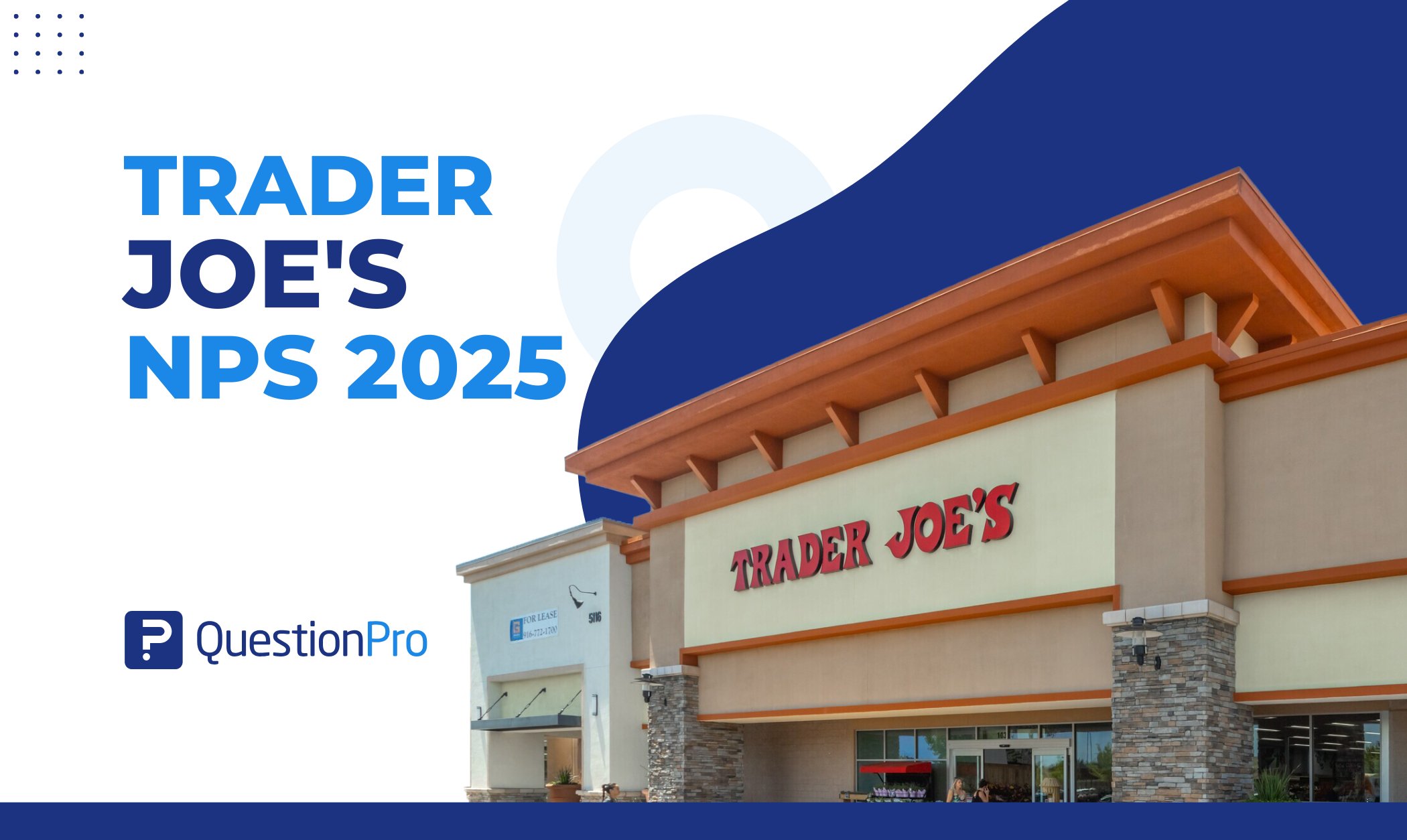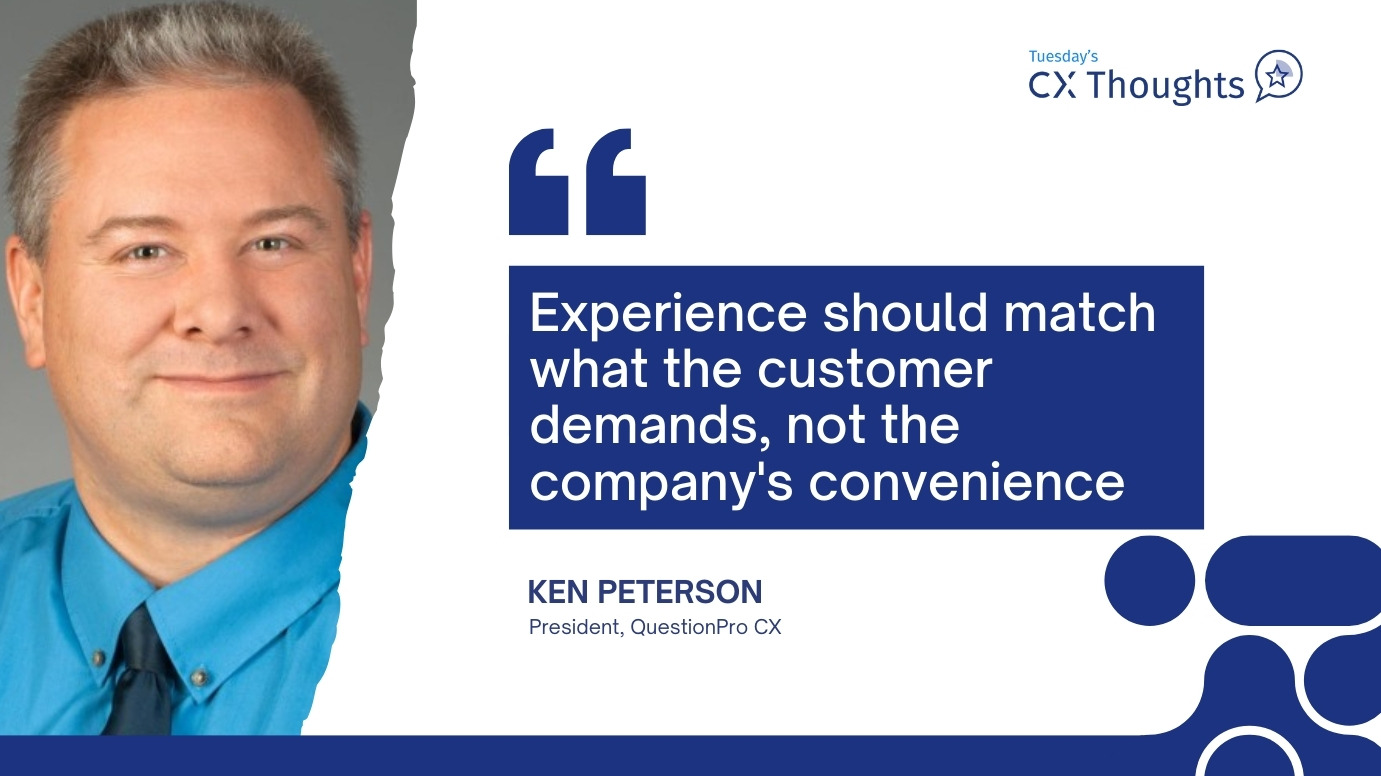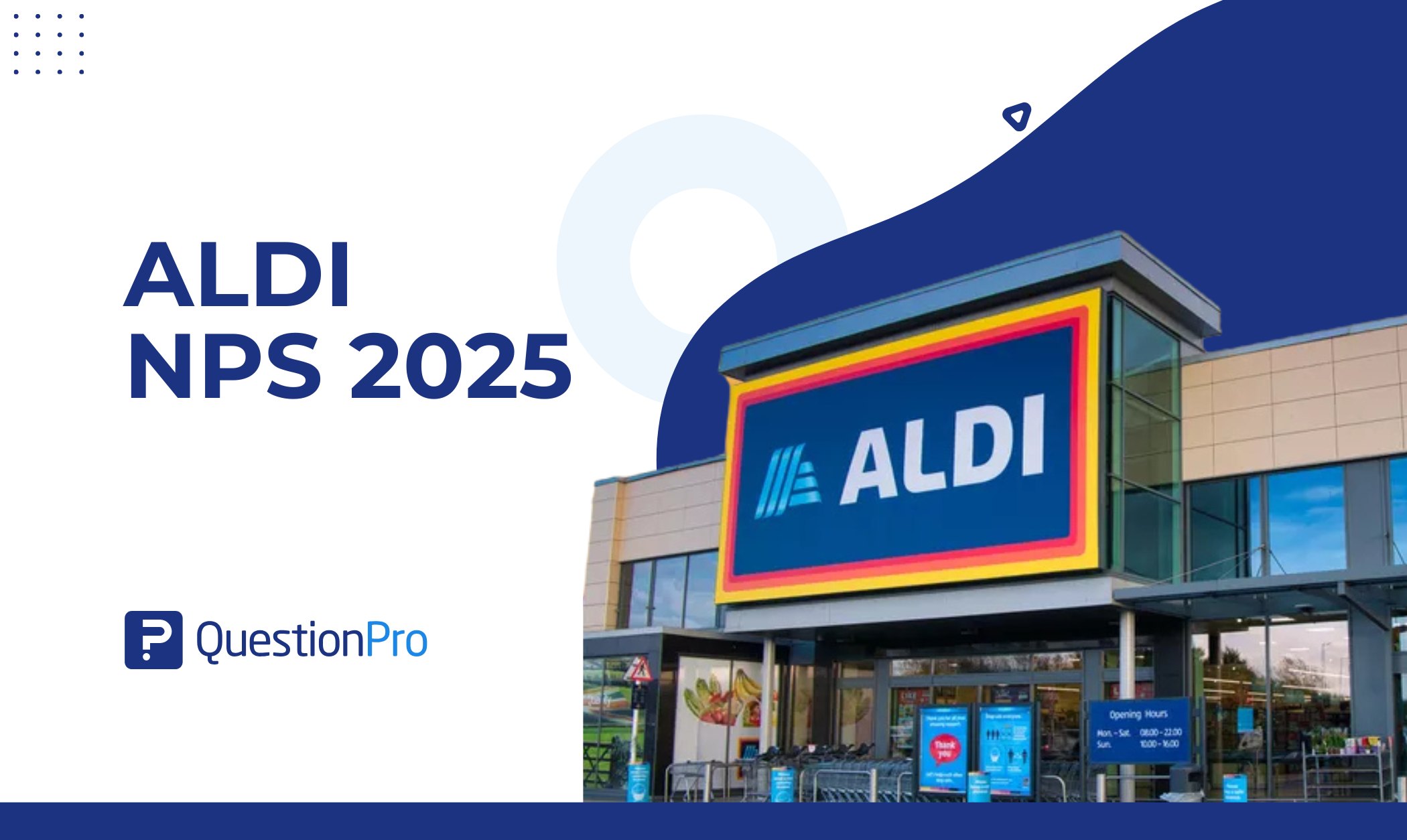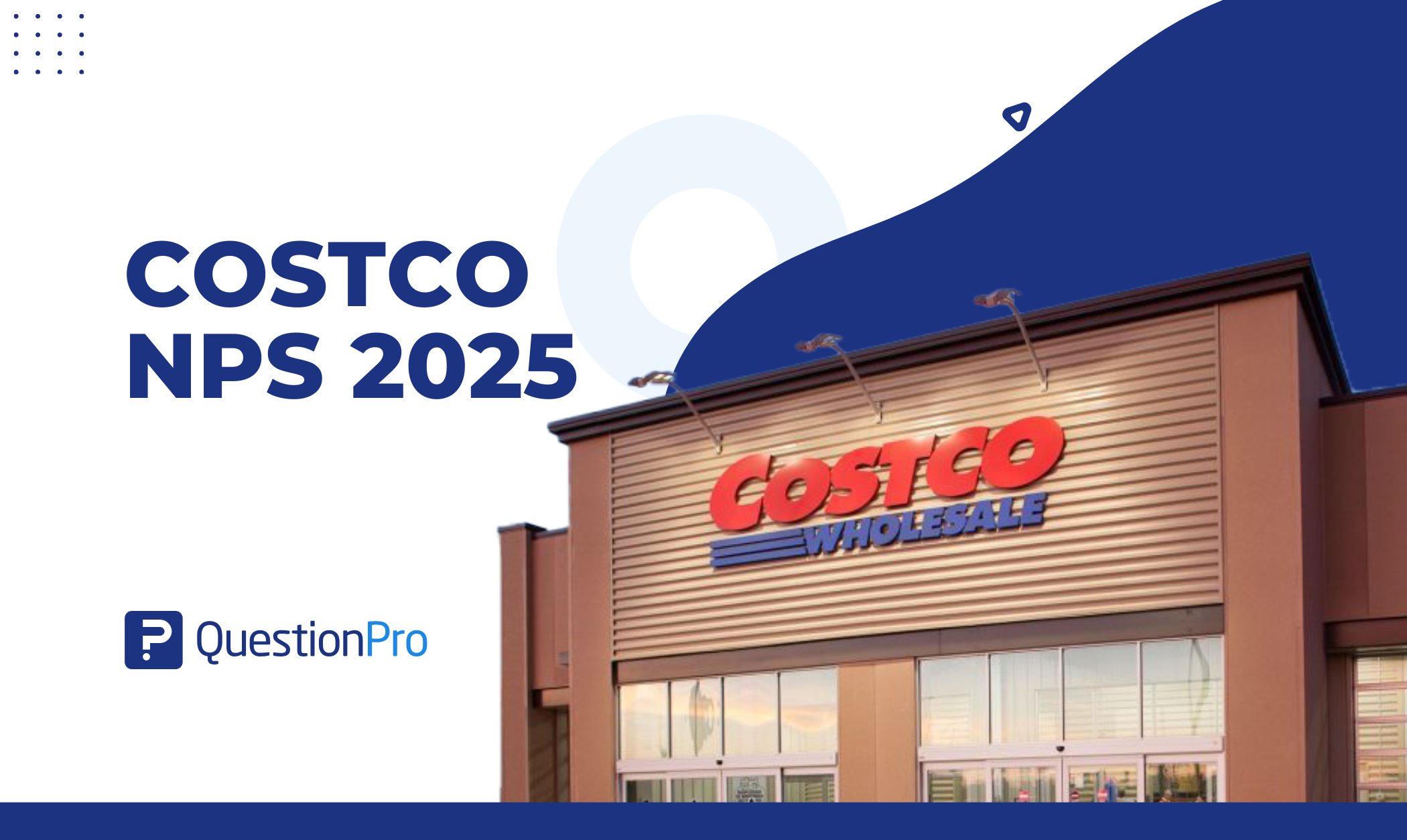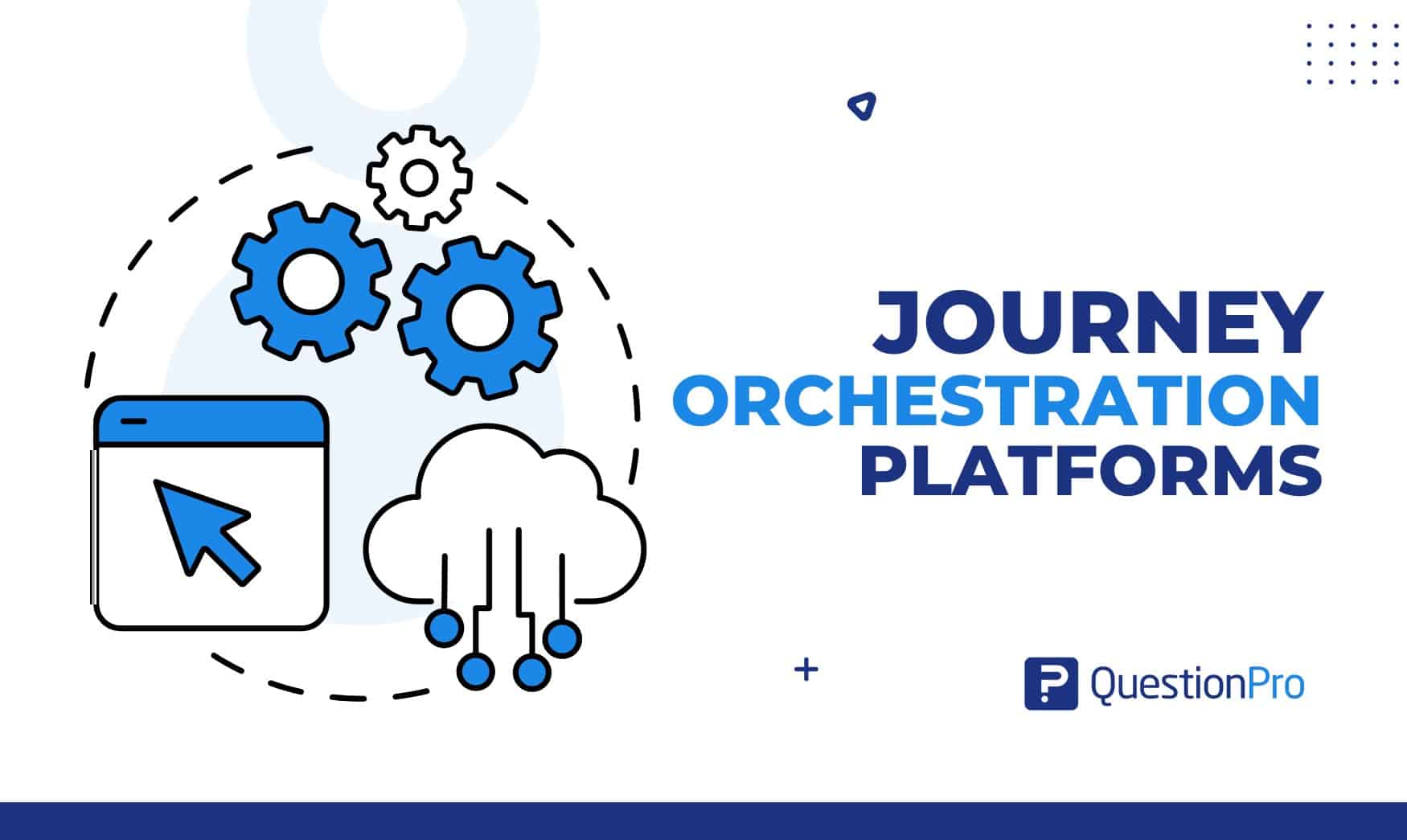
Journey Orchestration Platforms unify fragmented customer data from various sources, including online interactions, social media, and offline touchpoints. By centralizing this information, businesses gain invaluable insights into customer behaviors, preferences, and pain points. With this knowledge, they can craft tailored journeys that anticipate and fulfill individual needs, fostering deeper connections and driving loyalty.
The landscape is teeming with innovation, with platforms evolving to offer increasingly sophisticated features such as AI-driven insights, omnichannel integration, and predictive analytics. Furthermore, in an era defined by data privacy concerns and regulatory scrutiny, the ability of JOPs to navigate these challenges while still delivering exceptional customer experiences is paramount.
From established industry leaders to agile newcomers, the top 11 Journey Orchestration Platforms in 2025 represent the pinnacle of customer experience innovation. As organizations embark on their quest for JOP excellence, understanding the nuances and strengths of each platform is essential for making informed decisions that will shape the future of customer engagement.
What is Customer Journey Orchestration?
Customer Journey Orchestration is the strategic method of designing, managing, and optimizing the end-to-end customer experience across all touchpoints and channels. It involves understanding the customer’s interactions and preferences at each stage of their journey and orchestrating personalized interactions and communications to guide them seamlessly toward their goals.
Journey Orchestration aims to deliver cohesive and consistent experiences across all customer touchpoints, whether online, offline, or on various devices. It integrates data from multiple sources, such as CRM systems, web analytics, social media, and customer feedback, to gain insights into customer behaviors, customer preferences, and customer pain points.
Ultimately, customer journey orchestration technologies enable businesses to foster deeper connections with customers, drive engagement and loyalty, and optimize the overall customer experience to meet evolving expectations and business objectives.
What are Journey Orchestration Platforms?
Journey Orchestration Platforms (JOPs) are advanced software systems that streamline and optimize the customer journey mapping across various touchpoints and channels. They integrate data, analytics, and automation to deliver personalized experiences customized to individual customer preferences and behaviors.
At their core, JOPs serve as the backbone for mapping, managing, and orchestrating customer journeys throughout the entire customer lifecycle. They consolidate data from multiple sources, including online interactions, social media, CRM systems, and IoT devices, to create a unified view of the customer.
Journey Orchestration Platforms are not just about designing and automating complex customer journey analytics. They are about adaptability and continuous optimization. They incorporate triggers, decision points, and personalized content delivery, leveraging advanced analytics and AI-driven algorithms to optimize these journeys continuously, adapting to changing customer behaviors and marketing teams.
Top 11 Journey Orchestration Platforms
In a rapidly evolving business landscape, providing outstanding customer experiences has become a critical priority for organizations spanning various sectors. These platforms leverage advanced analytics, automation, and AI-driven insights to deliver personalized customer experiences that resonate with customers on a deeper level.
Let’s explore some top journey orchestration platforms revolutionizing how businesses engage with customers.
1. QuestionPro CX
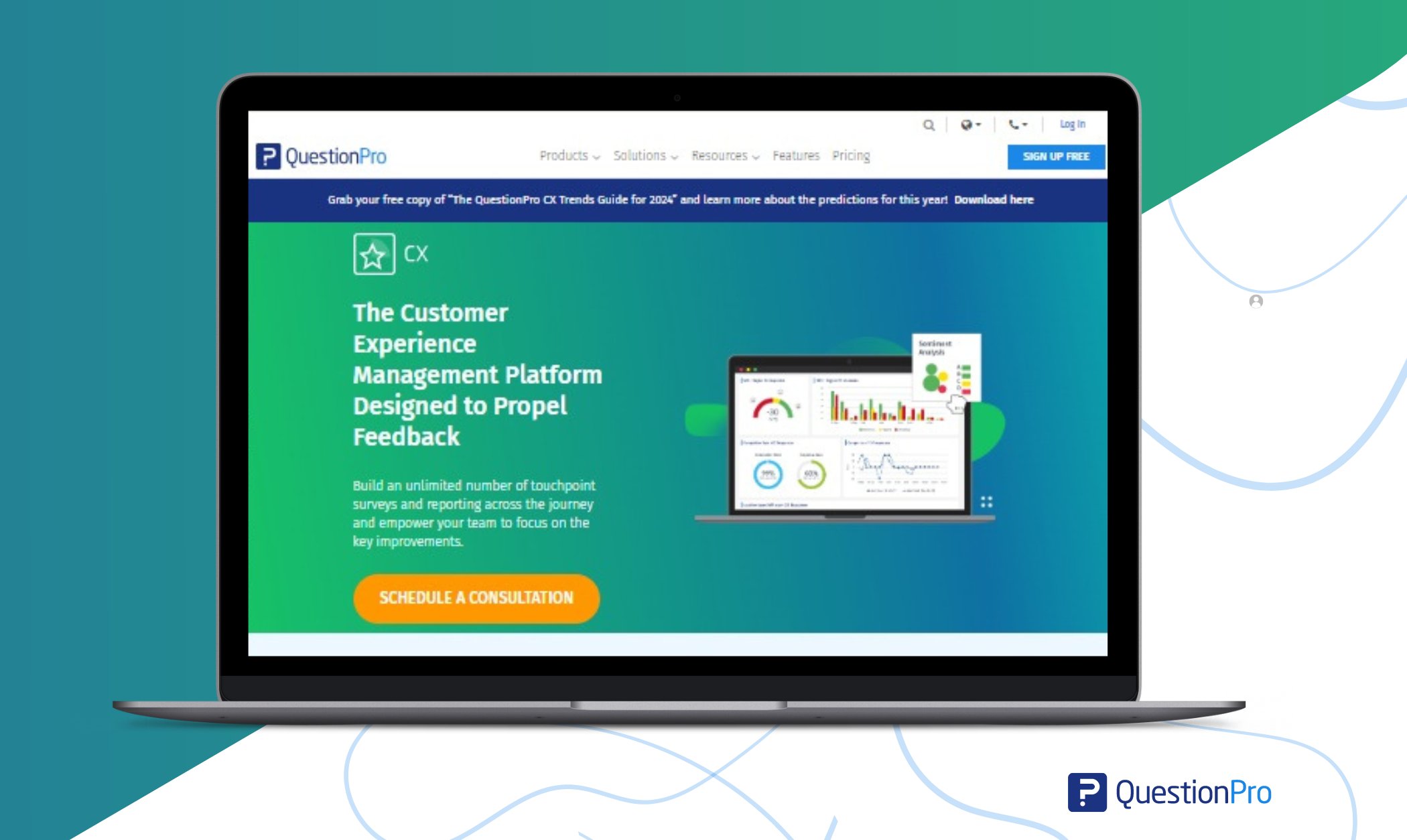
Renowned for its comprehensive suite of customer feedback and experience management solutions, QuestionPro offers a dynamic journey orchestration platform. With a robust array of tools for collecting and analyzing customer feedback across various touchpoints, businesses can gain invaluable insights into customer sentiments and preferences.
Features:
- Seamless integration with survey tools for capturing customer feedback.
- Customizable journey mapping capabilities to visualize and analyze customer experiences.
- Automated triggers and workflows for personalized interactions based on survey responses.
- Advanced analytics for deep insights into customer behaviors and preferences.
- Multichannel engagement options, including email, SMS, and in-app messaging.
- Collaboration tools for cross-functional teams to coordinate and optimize a customer journey.
Limitation:
- Advanced features require more effort and resources to be effectively used.
Pricing: The most popular plans start at $99 per month, and Team addition starts at $83. Pricing tiers are available for businesses of all sizes, and custom pricing options are available for enterprises with specific needs.
2. Qualtrics
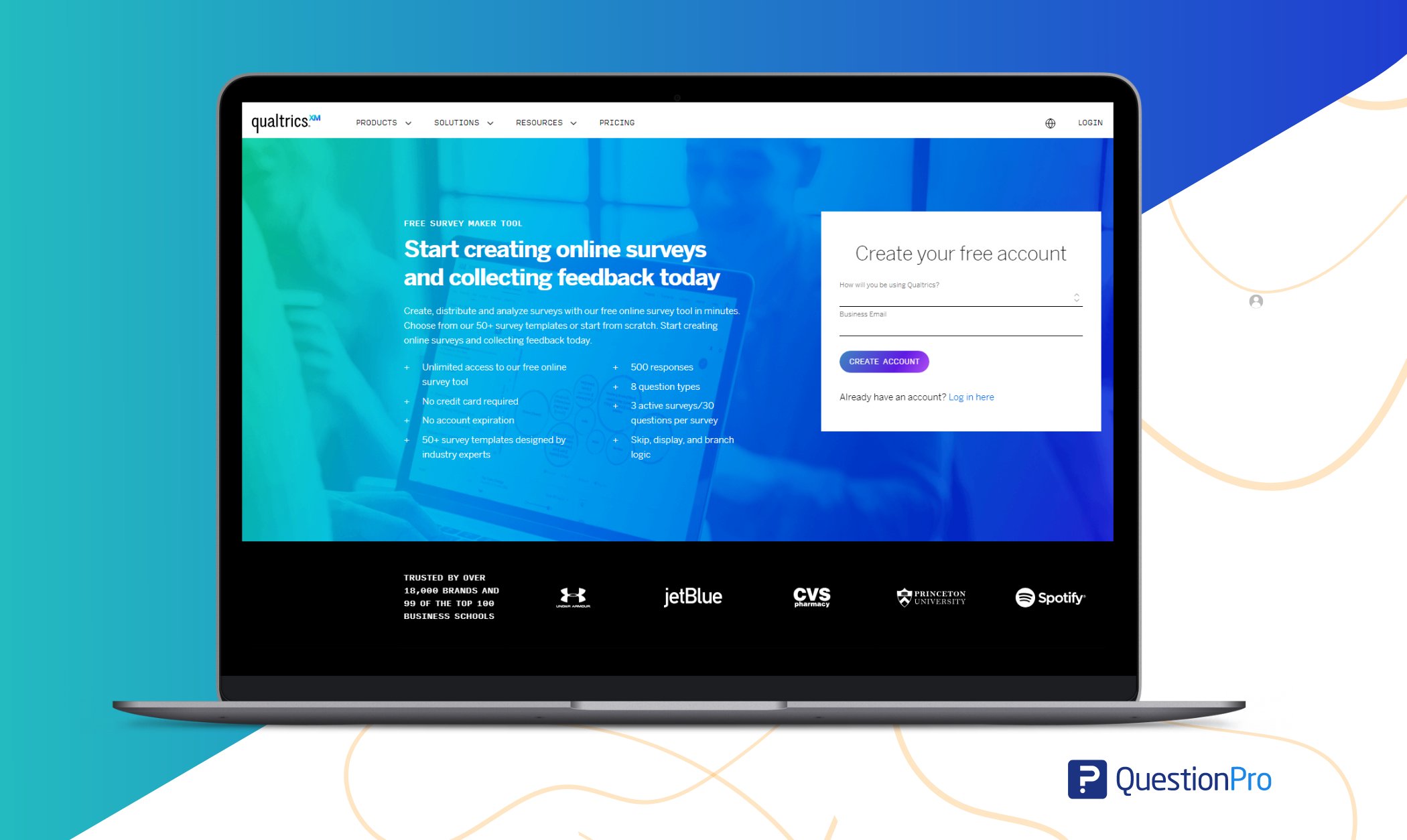
Positioned at the forefront of customer experience management, Qualtrics provides a versatile journey orchestration platform. It boasts powerful survey and feedback capabilities, allowing customer businesses to capture insights at every stage of the customer journey. Companies can better understand customer behavior and sentiment by integrating quantitative and qualitative data.
Features:
- Powerful survey and feedback management capabilities for understanding customer sentiment.
- Advanced journey mapping tools with drag-and-drop functionality for creating customized journeys.
- Real-time tracking and monitoring of customer interactions across channels.
- Integration with CRM systems for seamless data synchronization and personalized experiences.
- Action planning features to prioritize and implement improvements based on customer feedback.
Limitations:
- Higher pricing tiers may be prohibitive for smaller businesses.
- Limited customization options for journey orchestration workflows.
Pricing: Pricing is available upon request.
3. Alterian
Renowned for its innovative marketing solutions, Alterian offers a sophisticated customer journey orchestration platform. By seamlessly integrating data analytics and automation, Alterian enables businesses to deliver hyper-personalized experiences across all touchpoints. Utilizing sophisticated AI algorithms, Alterian sifts through extensive volumes of customer data to discern patterns, preferences, and avenues for enhanced engagement.
Features:
- Comprehensive customer data management capabilities for aggregating and analyzing customer data.
- Dynamic content personalization based on customer behaviors, preferences, and demographics.
- Journey visualization tools for mapping and optimizing customer journeys.
- Automated campaign execution and optimization features for efficient customer engagement.
- A/B testing functionality for optimizing messaging and content effectiveness.
- Integration with third-party tools and platforms for enhanced functionality and scalability.
Limitations:
- Requires additional training and expertise to maximize its capabilities thoroughly.
- Limited scalability for large enterprises with complex journey orchestration needs.
Pricing: Pricing is available upon request.
4. Trendemon
Trendemon’s cutting-edge journey orchestration platform optimizes customer journeys through data-driven insights and AI-powered recommendations. By harnessing real-time customer data from diverse sources, Trendemon empowers businesses to understand customer behavior and preferences with unparalleled granularity. Through sophisticated segmentation and targeting capabilities, companies can deliver personalized interactions that resonate with each individual.
Features:
- AI-powered journey analytics for deep insights into customer behavior and journey performance.
- Real-time journey tracking and monitoring to identify bottlenecks and opportunities for optimization.
- Personalization engine for delivering tailored content and experiences across touchpoints.
- Seamless integration with CRM and marketing automation platforms for data synchronization.
- Multichannel engagement capabilities, including email, social media, and website.
Limitations:
- Limited support for particular channels and touchpoints, such as offline interactions.
- Challenges in handling large volumes of data and real-time interactions.
Pricing: Starter plan starts at $1499 per month.
5. Genesys
As a leader in omnichannel customer experience solutions, Genesys offers a comprehensive customer journey orchestration platform designed to deliver personalized experiences across all touchpoints. Genesys enables businesses to create cohesive journeys that transcend individual interactions by unifying customer interactions from various channels and devices.
Features:
- Omnichannel customer engagement capabilities for seamless interactions across channels.
- AI-driven predictive routing for delivering personalized experiences based on customer intent.
- Journey orchestration tools for designing, executing, and optimizing customer journeys.
- Real-time analytics and reporting are used to monitor journey performance and identify areas for improvement.
- Integration with contact center solutions for unified customer engagement and support.
- Scalable architecture for handling large volumes of right data and interactions.
Limitations:
- Higher initial implementation and setup costs, especially for smaller businesses.
- Complexity in managing and configuring intricate journey orchestration workflows.
Pricing: The plan starts from $75 per month.
6. HubSpot
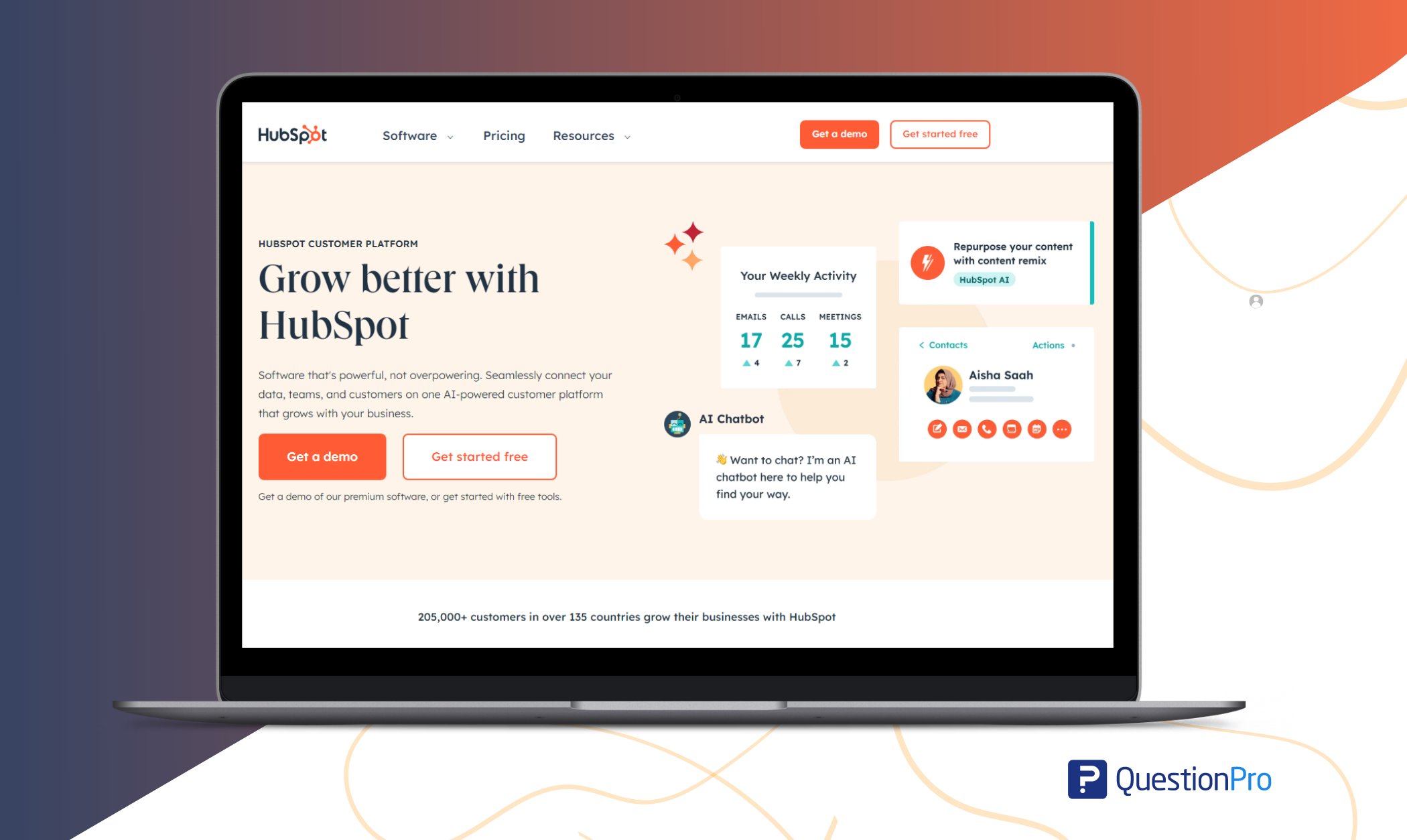
HubSpot’s all-in-one marketing, sales, and service platform includes a powerful journey orchestration component. Leveraging robust CRM and marketing automation tools, HubSpot enables businesses to create tailored customer journeys that drive engagement and nurture relationships.
Features:
- All-in-one marketing automation platform with journey orchestration capabilities.
- Customer segmentation tools for targeting specific audience segments with personalized content.
- Drag-and-drop journey builder for designing and visualizing customer journeys.
- Behavioral triggers and automation workflows for delivering timely and relevant communications.
- Integration with CRM for seamless data synchronization and personalized interactions.
- A/B testing and optimization features for refining messaging and content effectiveness.
Limitations:
- Some advanced journey orchestration features may only be available in higher-priced tiers.
- Integration limitations with specific third-party systems and tools.
Pricing: Additional seats start at $45 per month.
7. Medallia

Medallia is renowned for its comprehensive customer experience management solutions suite, which includes a sophisticated journey orchestration platform. By capturing and analyzing customer feedback from diverse sources, Medallia empowers businesses to understand customer sentiment and identify pain points throughout the journey.
Features:
- Comprehensive feedback management system for collecting and analyzing customer feedback across channels.
- AI-powered text analytics for extracting insights from unstructured customer feedback data.
- Journey mapping tools for visualizing and understanding the end-to-end customer experience.
- Action management features for prioritizing and implementing improvements based on customer feedback.
- Integration with CRM and other data sources for holistic customer insights.
- Role-based access control and collaboration tools for cross-functional teams to collaborate on customer experience initiatives.
Limitations:
- Focus primarily on customer feedback and experience management, with less emphasis on journey orchestration.
- Limited customization options for journey orchestration workflows.
Pricing: Pricing is available upon request.
8. Salesforce
Salesforce’s journey orchestration platform is integral to its industry-leading CRM solutions, enabling businesses to deliver personalized experiences at scale. By centralizing customer data and interactions, Salesforce offers businesses a holistic perspective on each customer’s journey, allowing them to forecast needs and provide pertinent content and offers.
Features:
- Unified customer data platform for aggregating and analyzing customer data from multiple sources.
- AI-powered predictive analytics for identifying trends and opportunities in customer behavior.
- Journey builder tool for designing and orchestrating personalized customer journeys.
- Multichannel engagement capabilities, including email, SMS, and social media.
- Integration with Salesforce CRM for seamless data synchronization and personalized interactions.
- AppExchange marketplace is used to extend functionality with third-party integrations.
Limitations:
- Higher costs are associated with licensing and implementation, particularly for smaller businesses.
- Complexity in configuring and managing journey orchestration workflows without dedicated expertise.
Pricing: Pricing is available upon request.
9. Braze
Braze offers a powerful journey orchestration platform that leverages real-time data and intelligent automation to deliver personalized messages and experiences across multiple channels. It helps businesses precisely create comprehensive customer profiles and target audiences by integrating customer data from various sources.
Features:
- Multichannel engagement platform for delivering personalized messages across channels.
- Behavioral targeting and segmentation capabilities for tailoring messages to individual preferences.
- Dynamic content personalization based on real-time customer data and behaviors.
- Automated workflows and triggers for orchestrating customer journeys.
- Real-time analytics and reporting for monitoring campaign performance and ROI.
- Integration with CRM and other data sources for unified customer insights and targeting.
Limitations:
- Complexity in navigating and configuring its wide range of features and capabilities.
- Limited support for certain journey orchestration use cases, such as multi-channel campaigns.
Pricing: Pricing is available upon request.
10. NICE
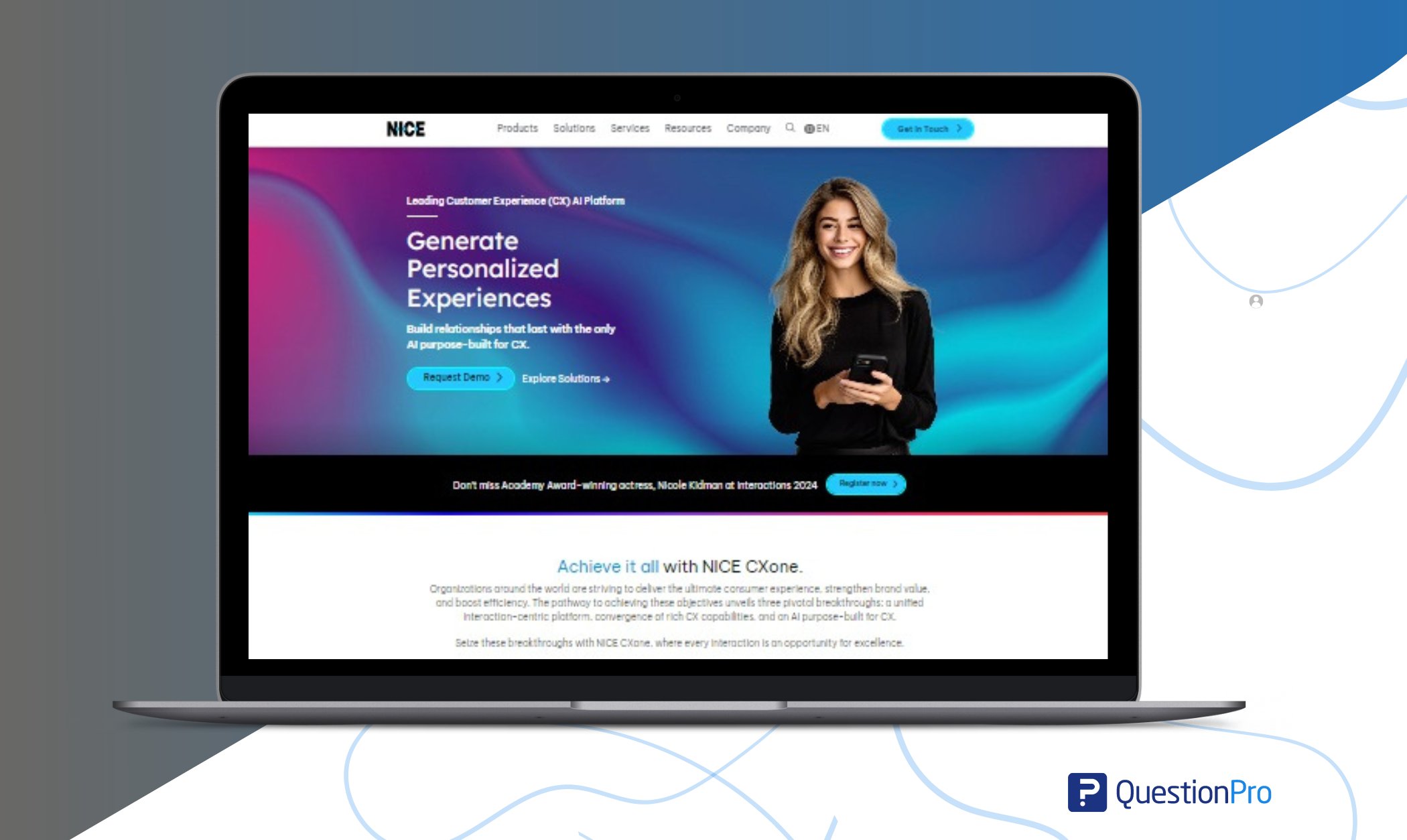
NICE provides an advanced journey orchestration platform that utilizes AI and analytics to optimize customer journeys and drive satisfaction and loyalty. By analyzing customer interactions and behaviors, NICE enables businesses to identify patterns and trends and anticipate customer needs.
Features:
- Real-time journey visualization and monitoring for identifying customer pain points and opportunities.
- Journey orchestration capabilities for designing and optimizing customer journeys.
- Interaction analytics is used to understand customer intent and sentiment across channels.
- Integration with contact center solutions for unified customer engagement and support.
- Compliance and security features for ensuring data privacy and regulatory compliance.
Limitations:
- Higher initial investment and implementation costs, particularly for smaller businesses.
- Limited scalability for organizations with rapidly growing customer bases and complex journey requirements.
Pricing: Plan starts from $71 per month
11. inQuba
inQuba’s journey orchestration platform focuses on driving customer engagement and loyalty through personalized experiences. By integrating data insights and automation, inQuba enables businesses to deliver tailored interactions across touchpoints.
Features:
- AI-powered customer intelligence platform for analyzing customer feedback and behavior.
- Journey mapping tools for visualizing and optimizing the end-to-end customer experience.
- Action planning features for prioritizing and implementing improvements based on customer insights.
- Collaboration tools for cross-functional teams to coordinate customer experience initiatives.
- Integration with CRM and other data sources for holistic customer insights.
- Real-time tracking and monitoring of customer interactions for proactive engagement and support.
Limitations:
- Integration challenges with specific CRM and marketing automation systems.
- Limited scalability for large enterprises with complex journey orchestration needs.
Pricing: Pricing is available upon request.
As businesses increasingly prioritize personalized experiences to foster engagement, loyalty, and growth, journey orchestration platforms have become indispensable tools. In today’s competitive landscape, where customer experience is paramount, these platforms are pivotal in shaping the future of engagement. They empower organizations to deliver tailored interactions that resonate with customers, driving market success and differentiation.
Why QuestionPro Can Be a Perfect Journey Orchestration Platform?
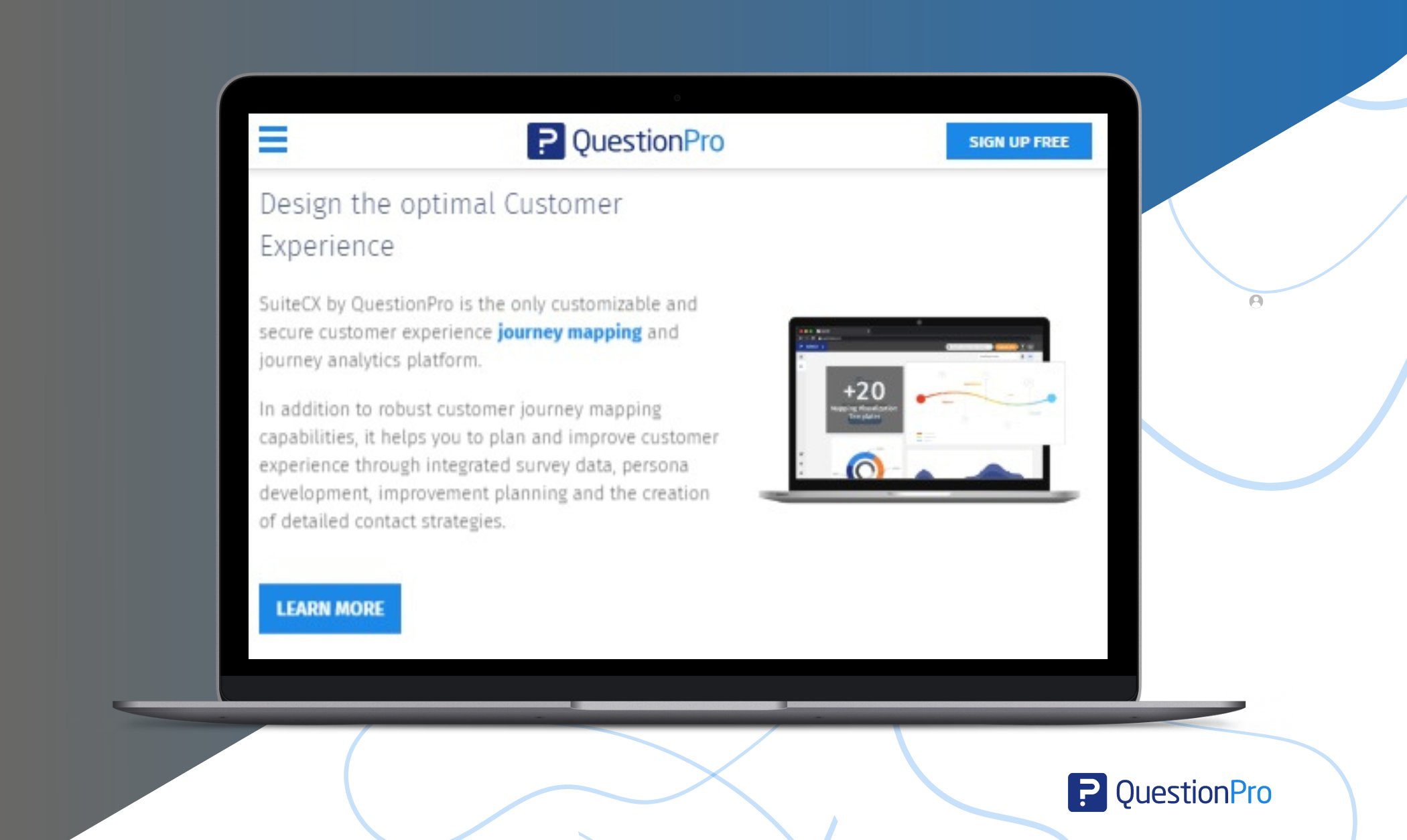
While QuestionPro is primarily known for its robust survey and feedback management capabilities, it also offers features that can make it a strong contender as a right journey orchestration platform (JOP). Here’s why it could be considered among the best in this category:
Advanced Survey Capabilities
QuestionPro’s expertise in surveys and feedback management provides a solid foundation for understanding customer preferences and behaviors. This data can be leveraged effectively in journey orchestration to personalize interactions and optimize the customer experience.
User-Friendly Interface
QuestionPro is known for its intuitive and user-friendly interface, which can be advantageous for businesses looking to implement journey orchestration without extensive technical expertise. The platform’s ease of use can facilitate quicker adoption and implementation.
Customization and Flexibility
While primarily designed for surveys, QuestionPro provides customization features that empower businesses to adapt the platform to their precise journey orchestration requirements. This flexibility enables organizations to craft individualized customer journeys that resonate with their brand identity and strategic goals.
Integration Capabilities
QuestionPro provides integration options with various third-party systems and tools, allowing businesses to leverage existing data sources and systems in their journey orchestration efforts. This seamless integration can streamline processes and enhance the effectiveness of the customer journey.
Cost-Effective Solution
QuestionPro may offer a more cost-effective solution than some other journey orchestration platforms, particularly for smaller businesses or those with budget constraints. Its pricing plans are often competitive, making it an attractive option for organizations looking to achieve sophisticated journey orchestration without breaking the bank.
QuestionPro may offer more extensive features and capabilities than dedicated journey orchestration platforms. Still, its strong survey capabilities, user-friendly interface, integration capabilities, customization options, and cost-effectiveness make it a practical choice for companies seeking a versatile and efficient solution for orchestrating customer journeys.
Conclusion
Journey Orchestration Platforms serve as the linchpin in modern customer experience strategies, offering businesses the tools and insights to navigate today’s multi-channel landscape complexities. By harnessing the power of data, analytics, and automation, these platforms enable organizations to orchestrate seamless and personalized journeys that resonate with individual customers.
From initial engagement to post-purchase support, businesses can leverage Journey Orchestration Platforms to deliver timely and relevant interactions, fostering stronger relationships and driving long-term loyalty. As businesses prioritize customer-centricity, Journey Orchestration Platforms will play an essential role in shaping the future of customer experience.
Their ability to unify disparate data sources, automate processes, and deliver personalized experiences at scale positions them as essential assets in the pursuit of customer delight. In an era where every real-time interaction management matters, Journey Orchestration Platforms empower businesses to meet and exceed customer expectations, driving sustained growth and differentiation in an ever-evolving marketing efforts landscape.
Frequently Asked Questions (FAQ)
A Journey Orchestration Platform (JOP) is a tool used by businesses to design, manage, and optimize customer journeys across various channels and touchpoints.
JOPs help businesses deliver personalized customer experiences, improve customer retention, increase operational efficiency, and achieve better marketing ROI through orchestrated, timely interactions.
Essential features include journey mapping capabilities, real-time data integration, automation tools, analytics and reporting, omnichannel support, and scalability to handle large volumes of interactions.




